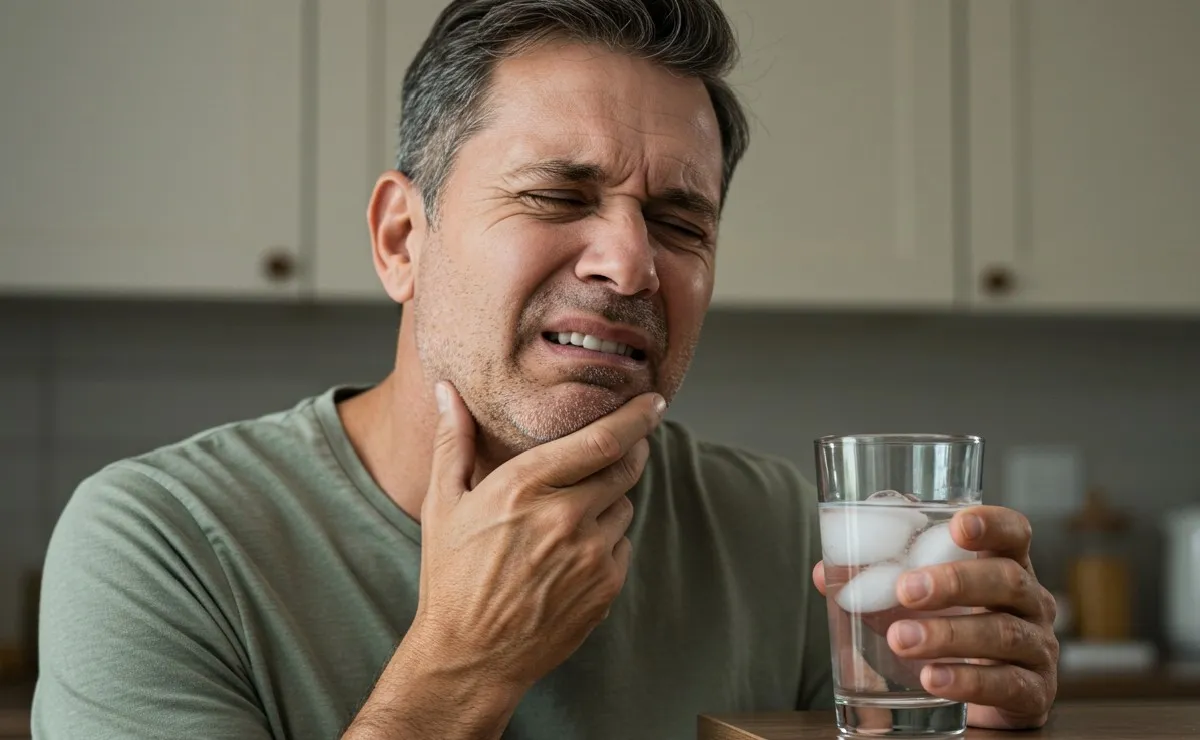Experiencing a toothache with cold drinks is not normal and could indicate conditions such as receding gums, tooth decay, or cavities. Here’s what you should know.
Toothache caused by exposure to cold temperatures —such as drinking ice water or eating cold foods—is a discomfort that can have a variety of causes, many of which require professional attention. Although it’s often attributed to tooth sensitivity, this symptom can also be related to cavities, dental infections, or defective restorations.
One of the main reasons is damage to the tooth enamel, which leaves the tooth’s internal nerves exposed. When these nerves come into contact with cold, they respond with a sharp, immediate pain. This sensitivity is often intensified if the enamel is worn down by aggressive brushing, acid consumption, or receding gums .
Additionally, if the tooth has a filling or restoration, the dental materials can expand or contract with sudden temperature changes, causing discomfort or pain. In other cases, the pain is due to pulpitis, which is inflammation or infection in the dental pulp, which can worsen in cold weather due to pressure on the inflamed nerves.
Common causes of a toothache due to cold
These are the most common factors behind a tooth that is sensitive to cold:
- Tooth sensitivity: when the enamel weakens or the root is exposed.
- Cavities: cavities that allow cold to pass through to the nerves.
- Fissures or fractures: small cracks that expose the internal structure.
- Gum recession can expose the roots of the tooth, increasing sensitivity.
- Defective restorations: poorly fitting or old fillings that no longer provide adequate protection.
- Inflammation or infection in the dental pulp, especially if there is constant pain even without thermal stimulation.
How to relieve a toothache caused by a cold?
To temporarily relieve pain, the following measures can be applied at home:
- Warm salt water rinses: help reduce inflammation and sensitivity.
- Cold compresses on the cheek: they have an analgesic and anti-inflammatory effect.
- Avoid very cold foods and drinks: opt for foods at room temperature or lukewarm.
- Using toothpastes for sensitive teeth: they help strengthen enamel and reduce pain.
- However, these solutions are only palliative. If the pain persists or worsens, it is essential to seek a dental checkup.
When to go to the dentist
If pain from colds persists, it’s crucial to visit a dentist. The specialist will perform a complete oral examination, possibly supplemented by X-rays, to identify the exact cause. Depending on the diagnosis, treatment may include:
- Fillings or resins in case of cavities.
- Periodontal treatments are needed if there is gum recession.
- Endodontics if an infection is detected in the dental pulp.
- Replacement or correction of old dental restorations.
How to prevent a toothache in the cold
The best way to avoid this type of pain is to maintain good oral hygiene:
- Brush at least twice a day with toothpaste specifically designed for sensitivity.
- Floss daily to remove food debris between teeth.
- Reduce consumption of sugars and acidic foods.
- Go for dental checkups every six months.
Why does a tooth hurt when drinking water?
Pain that occurs when drinking water, especially if it’s cold, is often a symptom of tooth sensitivity or damage. Common causes include:
- Enamel wear leaves the nerves exposed to external stimuli.
- Incipient or deep caries: allow fluid to enter sensitive areas.
- Infections in the dental pulp can cause pain even with liquids at room temperature.
- Inflamed gums: Gingivitis and other periodontal diseases can increase sensitivity.
Toothaches caused by cold are not something to be ignored. They can indicate anything from simple tooth sensitivity to more serious problems such as cavities or infections. The only way to determine the exact cause and receive effective treatment is to see a dentist. Maintaining good oral hygiene habits, using appropriate products, and having regular checkups is key to avoiding this type of discomfort.























+ There are no comments
Add yours